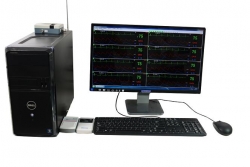Wechat QR code

TEL:400-654-1200

TEL:400-654-1200

Patient monitor
A patient monitor is a device or system used to measure and control a patient's physiological parameters and to compare them with a known set value that can alert if an overshoot occurs.
The basic principle of
Through the sensor sensing a variety of physiological changes, Ltd. then the amplifier to strengthen the information, then converted to electricity information, through the data analysis software for calculation, data analysis and editing, and then each function module is displayed in the display or record, according to need to print, when monitoring data is beyond the set of indicators, will stimulate the alarm system, sends a signal to attract the attention of medical staff.
Clinical application of
During and after surgery, trauma nursing, coronary heart disease, Ltd.critical patients, newborns, premature infants, hyperbaric oxygen chamber, delivery room, etc.

Test parameters
Standard 6 parameters: ecg, respiration, noninvasive blood pressure, oxygen saturation, pulse, temperature. Others: invasive blood pressure, end-respiratory carbon dioxide, respiratory mechanics, anesthetic gas, cardiac output (invasive and non-invasive), eeg dual frequency index, etc.
1. The ecg
Electrocardiogram is one of the most basic monitoring items of the monitoring instrument. Its principle is that after the heart is stimulated by electricity, the excitement produces electrical signals, which are transmitted to the surface of the human body through various tissues. The probe detects the changed potential and conducts it to the input end after amplification. This is done by using lead wires attached to the body. The lead contains shielding wires, which can prevent electromagnetic fields from interfering with weak ecg signals [1].
2. The heart rate
Heart rate measurement is based on the ecg waveform, the measurement of instantaneous heart rate and average heart rate.
The average heart rate of a healthy adult in a quiet state is 75 beats per minute, and the normal range is 60-100 beats per minute.
3. Breathing
The main thing is to monitor the patient's respiratory rate. For calm breathing, 60-70 times per minute for newborns and 12-18 times per minute for adults.
4. Non-invasive blood pressure
Noninvasive blood pressure monitoring USES the kirschmannberg sound test, which blocks the brachial artery with inflatable cuff bands. During the process of blocking the pressure drop, a series of voices with different tones will appear. Systolic and diastolic blood pressure can be determined according to the tone and time. When monitoring, the microphone is used as a sensor. When the cuff pressure is higher than the systolic pressure, the blood vessels are compressed and the blood flow under the cuff stops. The microphone has no signal. When the microphone detects the first kirschner sound, the corresponding pressure of the cuff is systolic pressure. Then the microphone measures the kirschner sound again from the reducing stage to the silent stage. The corresponding pressure of the cuff is diastolic pressure.